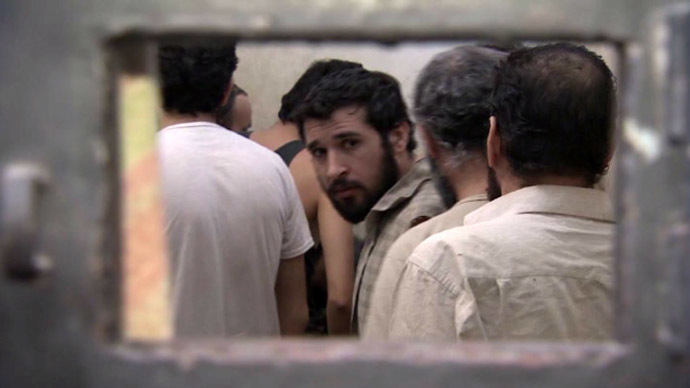Recruited by Al-Qaeda: Foreign fighters in a Damascus jail tell their stories
Raouchan Gazakov brought his family to Syria, taught his 5-year-old son to make bombs and bade farewell to his relative, a suicide bomber. RT’s Maria Finoshina talked to him in a Damascus prison and asked him why he came to fight for Al-Qaeda.
“A group called Murad approached me a year ago and convinced
me that Muslims in Syria are being oppressed and killed, and that
I should go and take up arms against Assad for world jihad,”
Raouchan said in the spartan prison, where some 200 inmates are
held – most of them jihadist fighters for Al-Qaeda or affiliated
groups. The prisoners’ fate is unknown, although it looks
grim.
Raouchan says he sneaked into Syria last January through Turkey. In Istanbul, two men claiming to be from Al-Qaeda met Raouchan and accompanied him to Syria. There, he joined a large terrorist group run by an Egyptian jihadist.

“My job was mainly to prepare bombs for cars. There were many
people, all from different countries. Our ‘teachers’ showed us
how to make bombs – which ingredients to use, and how exactly to
make them,” he says.
Raouchan came with his entire family to Syria. In a macabre home movie later found on his laptop, he, his son and a group of men say goodbye to their male relative, who is about to go and blow up a police station in a suicide bomb attack.

In another video, Raouchan shows his son how to make a bomb.

In the Damascus prison, there are many stories of men recruited
from faraway lands to come fight for jihad in Syria.
Another detainee, Amer El Khadoud, tells Maria Finoshina how he
left a normal life in France, where he lived for years with his
wife, a French woman, to join the Syrian jihad with an Al-Qaeda
affiliated group.
“I volunteered,” says Amer. “I went to Turkey. In a refugee camp, there I met a Salafi group and I trained with them for about 2 1/2 months, and then we illegally crossed the border into Syria.”

However, upon his arrival, Amer says he was disappointed that the
jihad was not as he was promised.
“I saw my Sunni Syrian brothers suffering here. I saw on Al-Jazeera, Al-Arabiya and other channels that kids are also suffering. I took up arms, and I was ready to use them. But when I came here – I didn’t see the enemy.”

The prisoners’ stories of Al-Qaeda recruitment came as a new
report, published by the Washington think tank Bipartisan Policy
Center, entitled “Jihadist Terrorism: A Threat Assessment,”
concluded that "the civil war in Syria may provide Al-Qaeda
with an opportunity to regroup, train and plan operations.”
The presence of so many foreign jihadist fighters in the Damascus
prison appears to support the center’s findings.
“Foreign fighters hardened in that conflict could eventually
destabilize the region or band together to plot attacks against
the West," the report said.
Reports have been growing for some time of jihadists recruited
internationally to fight against Assad’s government.
For instance, in January, a leaked memo provided an inside look
at how Saudi officials commuted the sentences of 1,200 death row
inmates on the condition they join the rebels and fight against
Assad in Syria, the Assyrian International News Agency reported.














